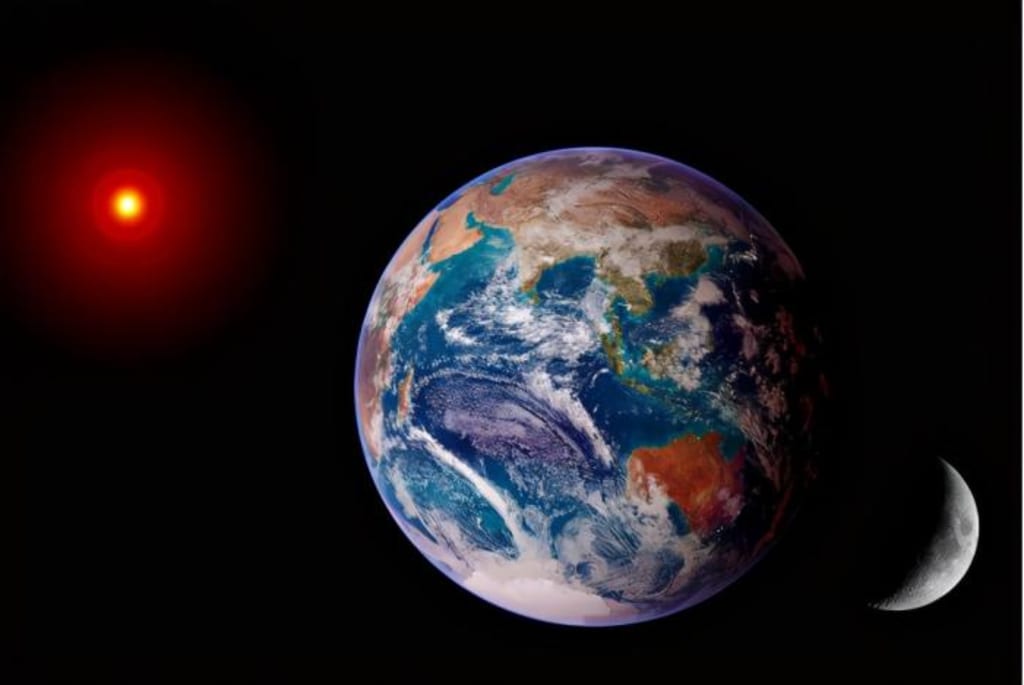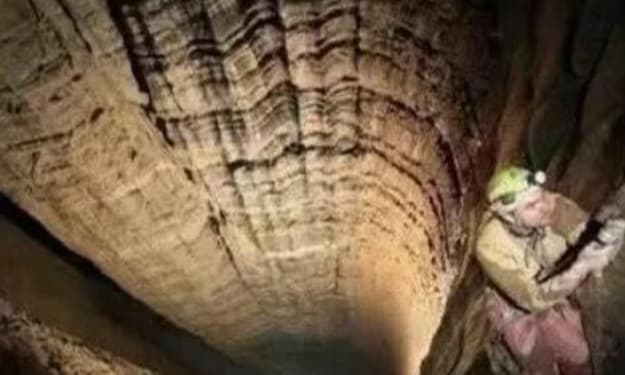What would happen if the earth stopped spinning? Scientists: This day will come sooner or later
Whether in nature or in the universe, motion is absolute, and stillness is relative.

Whether in nature or in the universe, motion is absolute, and stillness is relative. Even if life on earth does not actively move, the cells in its body stop moving all the time. Although the celestial bodies in the universe are not living bodies, they are in motion all the time. Satellites revolve around planets, planets revolve around stars, and stars revolve around the center of galaxies. Some planets also rotate while revolving, and our earth is a typical case.
Earth's rotation began before life appeared. The rotation of the earth creates the difference between night and day on the ground, and life forms have also adapted to the changes of day and night in the long evolution. If one day the earth suddenly stops rotating, can life on earth still survive? In recent years, some scientists have found that the speed of the earth's rotation has been slowing down. If this trend continues, the earth will stop rotating in less than 100 million years.
So what caused the Earth's rotation to slow down? What would happen if the Earth eventually stopped spinning?
Does one rotation of the earth really equal one day?
Before discussing these issues, we first need to have a preliminary understanding of the earth's rotation. This is necessary because many people think that one rotation of the earth is equivalent to one day, which is 24 hours. Is this true? In fact, the rotation period of the earth is not exactly equal to the time of "one day" defined by human beings. Modern science defines a day as 24 hours, which is a constant length of time, while the cycle of the earth's rotation is not fixed, and there are certain fluctuations.
The current calculated rotation period of the earth is 23 hours, 56 minutes and 4.09 seconds, but this number will change after decades or hundreds of years, because the rotation speed of the earth fluctuates. Since the real rotation period of the earth is less than 24 hours, why do scientists define the time of a day on the earth as 24 hours? This is because scientists discovered that the earth's rotation period is more than 365 days while the earth's rotation is less than 24 hours.
Therefore, they averaged the extra time of the revolution cycle to 365 days, and the time per day is very close to 24 hours. 24 hours a day has become an internationally recognized time unit, and it has become a measure of people's daily life and rest. Even if the earth's rotation cycle changes slightly, reducing or increasing a few minutes or ten minutes, it will not affect the vast majority of people. Therefore, to a large extent, it has nothing to do with the rotation period of the earth.
How has the Earth's rotation speed changed?
However, for practitioners in some special industries, they have high requirements for the accuracy of time, which requires scientists to adjust the time measurement unit according to the rotation period of the earth every year. Since the beginning of the last century, many astronomers have been studying the rotation of the earth, and everyone has found that the rotation speed of the earth is not uniform. After more than 100 years of observation and analysis, three changes in the rotation speed of the earth have been summarized.
First, there is a long-term slowdown in the rotation speed. This refers to a situation in which the Earth's rotation slows down for as long as a century, and there may be many consecutive slowdowns, resulting in a cumulative slowdown of a large number. Scientific research has found that the earth has experienced a long-term slowdown over the past 2,000 years, with a cumulative slowdown of more than 2 hours.
The earliest changes should have started in the Ordovician period 440 million years ago. Scientists estimate that the earth's time in a year is equivalent to 412 days, and two thousand years later, there are only about 400 days left in a year, which shows that the earth's rotation is slow. Speed is slowing down. Why do you say that? The orbit of the earth around the sun is unchanged, and the revolution speed is basically unchanged, so the distance traveled by the revolution in one year is fixed. If the Earth's rotation speeded up, then the time of year should be shortened.
If the Earth's rotation slows down, then the day becomes longer and the year has fewer days. The second type of change is cyclical. Astronomers in the 1950s discovered through observations that the Earth's rotation fluctuates seasonally, such as slowing down in spring and accelerating in autumn. The seasonal cycle change of the rotation speed is generally around 20-25 milliseconds, and some studies have shown that this situation is mainly caused by the seasonal change of the wind.
There is a third case, irregular variation. This situation has occurred relatively rarely in history, and every time it occurs irregularly, scientists currently do not know what causes this change.
What is the practical significance of the earth's rotation?
We live with the positive effects of the Earth's rotation every day, but many people don't know it. The rotation of the earth makes the earth alternate day and night, which is especially important for all things. Since the earth itself is a non-luminous and opaque sphere, all areas on the surface of the earth need to be illuminated by sunlight, so that the life forms on the surface have the opportunity to grow and develop. Therefore, when the earth rotates, the surface of the earth begins to There is a clear distinction between day and night, and the length of day and night is not much different.
From the perspective of the growth of all things, the rotation of the earth is the premise of the biological clock, reproductive cycle and other physiological cycles. The rotation of the earth causes day and night to alternate in any region except the polar regions, giving the creatures on the ground enough time to move and enough time to rest, and a stable physiological cycle is formed over time. From the perspective of human society, the rotation of the earth helps us define local time and zone time.
For people who rarely cross regions, local time and zone time are not very useful. But for those who conduct cross-regional trade, tourism, academic exchanges, etc., the correct local time and zone time can help them plan their time.
What causes the Earth's rotation to slow down?
As mentioned above, there are three changes in the rotation speed of the earth, of which the first change-long-term slowdown is the main trend at present. Over the past 40 years, scientists have found that the Earth's rotation has slowed down by a cumulative 25 seconds. If this trend continues, the Earth will stop spinning in 63 million years. This will have a great impact on life on Earth. The specific impact will be discussed later. Now we have to figure out what causes the Earth's rotation to slow down.
Scientists currently have several views, the first view is caused by the increasing size of the earth. The same concern as the slowdown of the earth's rotation speed is that the distance between the earth and the moon is constantly expanding. Some scientists have combined these two events to analyze and believe that it may be due to the decrease in the density of the earth due to the expansion of the earth's volume, which leads to The Moon's gravitational pull has weakened, which in turn causes the Moon to be less bound, giving it a chance to move away from Earth.
On the other hand, the moon's gradual receding from the Earth in turn causes the weakening of the tidal action on Earth, which provides some of the momentum for Earth's rotation. When the rotation amount decreases, the rotation speed also decreases. There are also scientists who think about the problem from the perspective of the earth's nature and believe that earthquakes have had a significant impact on the earth's rotation. The study found that after each major earthquake, the heavy elements in the earth's crust sink and the light elements rise, which makes the earth's mass concentrated inward.
This situation also causes a decrease in the amount of Earth's rotation, which reduces the speed of the Earth's rotation. In addition, some scientists believe that human activities have also caused the slowdown of the Earth's rotation, the most obvious of which is the greenhouse effect. The greenhouse effect leads to the melting of ice sheets in high latitudes and high altitudes around the world, which not only promotes the rise of global sea levels, but also promotes the average distribution of mass on the earth's surface. This situation will also lead to a decrease in the amount of rotation, reducing the speed of the Earth's rotation.
What are the effects of the slowing down of the Earth's rotation?
The slowdown of the Earth's rotation is not a day or two, so it needs to be looked at from a short-term and long-term perspective. From a short-term perspective, the slowdown of the earth's rotation speed in thousands or even tens of thousands of years will not have a huge impact on the earth's life. There is a benchmark by which time is measured.
From a long-term perspective, the cumulative effect of the slowing Earth's rotation will continue to be amplified over time. If things continue as they have been for the past 40 years, after 63 million years the Earth will stop spinning and the Earth will be in chaos. Before the earth stops rotating, the survival and reproduction of life on earth will be affected, such as the maturation period of species or the mating period being delayed.
The most obvious consequence of this assumption is that the earth will no longer have night and day, and any region will be in day or night for long periods of time, all seasons of the year. This will cause the side that is illuminated by the sun to get plenty of light, while the side facing away from the sun will be permanently dark, this situation will lead to the extinction of a large number of species, even if some species eventually survive, it will become completely different from today's species.
After the earth stops rotating, the fastest consequence may be that everything on the surface will be thrown away by inertia. Because everything on the surface is shrouded under the atmosphere, and the atmosphere is in inertial motion as the earth rotates. If the earth's rotation suddenly stops, humans on earth may not feel it, but the atmospheric motion will react soon, and it will continue to move forward under the action of inertia, causing the atmosphere and the ground, which were originally moving relative to each other, to change. It becomes the absolute motion of the atmosphere, which eventually causes all objects on the ground to suffer from powerful hurricanes.
About the Creator
witty lukas
The doubts held by human beings are the germs of science






Comments
There are no comments for this story
Be the first to respond and start the conversation.